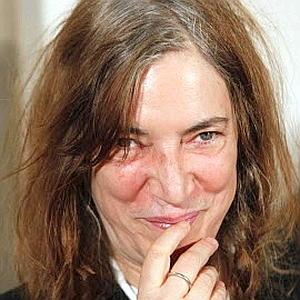One Art
Patti Smith
"An artist wears his work in place of wounds."
Described as "the poet laureate of punk rock," Patti Lee Smith was born December 30, 1946 in Chicago. The eldest of four siblings, she was raised in rural South Jersey. Her mother was a waitress and her father worked in a factory. Faced with harsh financial conditions, her parents sometimes had  not enough to nourish their children. But books, music, and art were by no means absent. Her father quoted from Greek philosophers over dinner and her mother (an occasional nightclub singer) cherished opera.
not enough to nourish their children. But books, music, and art were by no means absent. Her father quoted from Greek philosophers over dinner and her mother (an occasional nightclub singer) cherished opera.
Smith read William Blake's Songs of Innocence and of Experience when she was a child: "I thought he was a children's writer, and in a way he was - making me aware of the life of a chimney sweep. But then I grew with Blake, with his sense of spirituality, of social activism, his visionary experience, his compassion for the flaws in human nature and his own nature." Many years later, she would attend the launching of a Blake exhibit at Tate Britain and reiterate her esteem for Blake's work with a solo performance held in St James's Church, where he had been baptized.
Smith won an art scholarship to Glassboro State Teachers College but was expelled when she got pregnant. She gave up her newborn for adoption and in 1967 moved to New York City with some pencils, a notebook, $32, and a copy of Illuminations by Rimbaud. She became active in the downtown Manhattan bohemian circles, writing poetry and living with Robert Mapplethorpe - artist, collagist, and photographer. She reminiscences on the hardships of the time: "When we met in 1967, we were both artists, both working in bookstores. (…) We would spend whatever money we had on books, even if we had nothing to eat, and spent a lot of time together with our Blake books."
When the couple moved to the legendary Chelsea Hotel in 1969, they met numerous poets and writers. These included Allen Ginsberg, William Burroughs (who once said that Smith "rings the bell of pure poetry"), Gregory Corso, and Jim Carroll. On February 10, 1971, Smith asked the guitarist Lenny Kaye to add some melodic accompaniment during a reading she gave in St. Mark's Church. Her natural gifts were patently obvious during the show, and she became a rock star with a cult following more or less immediately. (Smith would make a triumphant return to St. Mark's Church on February 9, 2011 - forty years after her first poetry reading there).
In 1978 Smith released her most commercially successful album, Easter, which included the phenomenal single, "Because the Night," co-written with Bruce Springsteen. Smith's drawings have been exhibited at the Georges Pompidou Center in Paris and the Museum of Modern Art in New York. In 2002, a display of her drawings opened at the Warhol Museum in Pittsburgh. In 2003 she was the recipient of the Torino Poetry Award. In 2005 Smith was decorated Commandeur des Arts et des Lettres, France's highest acknowledgment of artists. In 2007 she was inducted into the Rock and Roll Hall of Fame. In addition to recording, performing, and writing, Smith remains involved in public debates and continues to work as a human rights activist.
The Coral Sea (1996) is an elegiac poetic tribute to Mapplethorpe who died of AIDS in 1989. In Edmund White's words, Smith "was once our savage Rimbaud, but suffering has turned her into our St. John of the Cross, a mystic full of compassion." Her most recent volume of poetry, Auguries of Innocence (2005), is - in addition to Blake - influenced by Rimbaud and Baudelaire. In 2010 Smith published Just Kids, a chronicle of her deep friendship with Mapplethorpe. The book ("one of the best books ever written on becoming an artist," according to The Washington Post) won the National Book Award for nonfiction.
Smith's first album, Horses, was released in 1975. The producer was John Cale, the co-founder (with Lou Reed) of the Velvet Underground. The album opens with "Gloria," a reworking of Van Morrison's rock classic written in 1963, at the time he turned eighteen. (Smith's 1976 live rendition of this song is available at http://vimeo.com/5456823.) The lyrics are from Smith's following celebrated poem (belonging to the period 1970-1972) in Early Work, 1970-1979 (1994). You can hear Smith read the poem at http://videos.apnicommunity.com/Video,Item,3430817568.html.
oath
Jesus died for somebody's sins
but not mine
melting in a pot of thieves
wild card up my sleeve
thick heart of stone
my sins my own
I engrave my own palm
sweet black X
Adam placed no hex on me
I embrace Eve
and take full responsibility
for every pocket I have picked
mean and slick
every Johnny Ace song
I've balled to
long before the church
made it neat and right
So Christ
I'm giving you the good-bye
firing you tonight
I can make my own light shine
and darkness too is equally fine
…